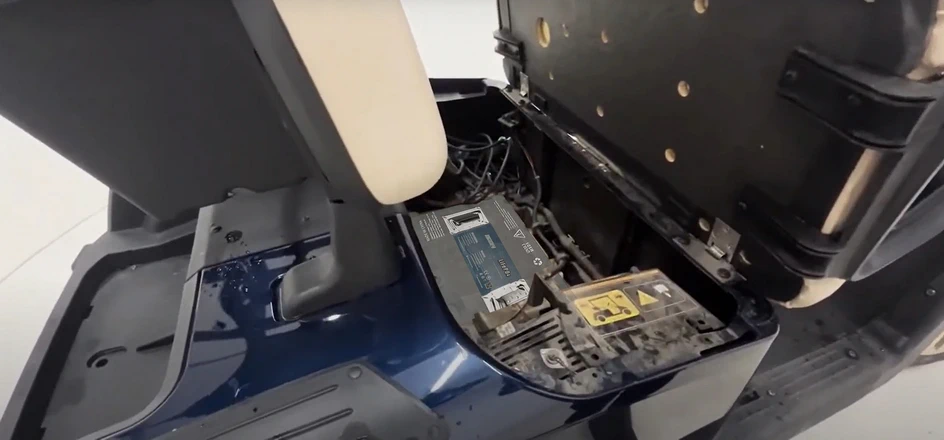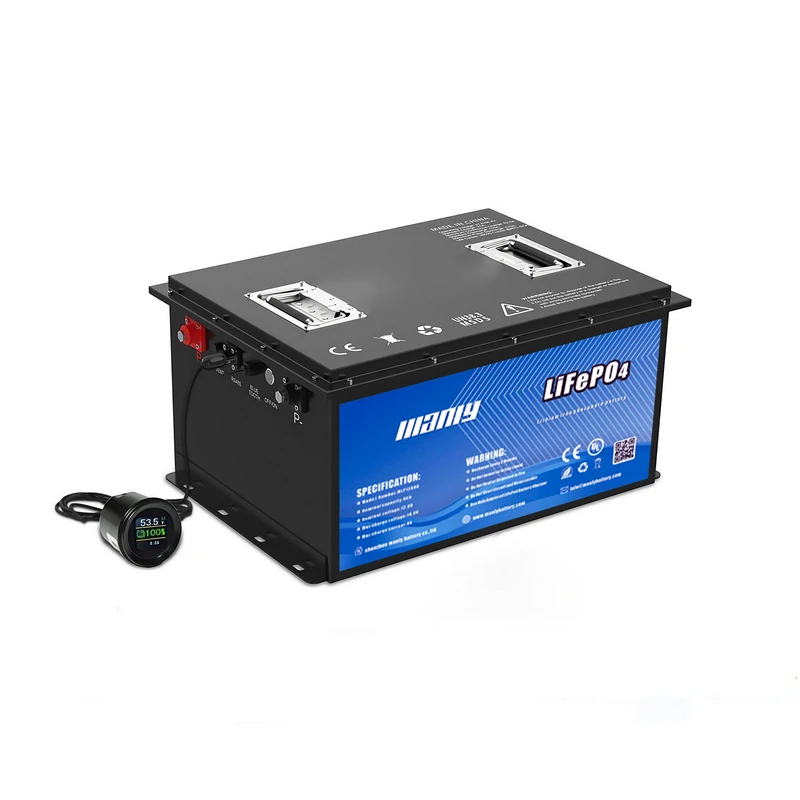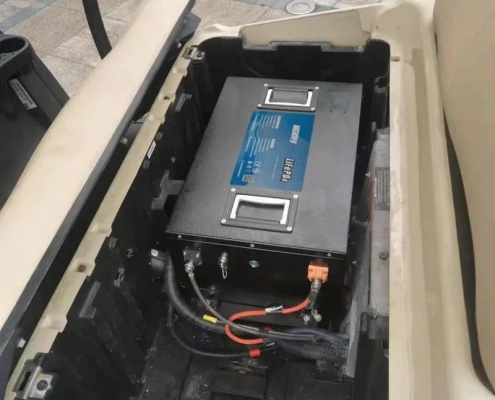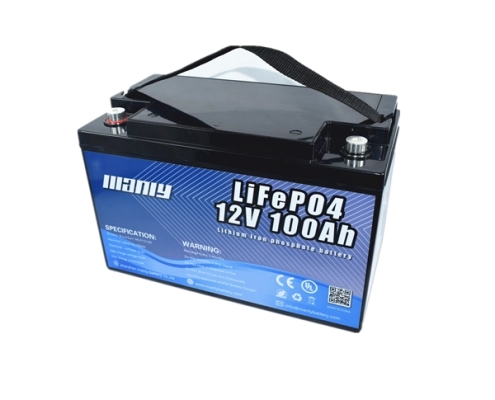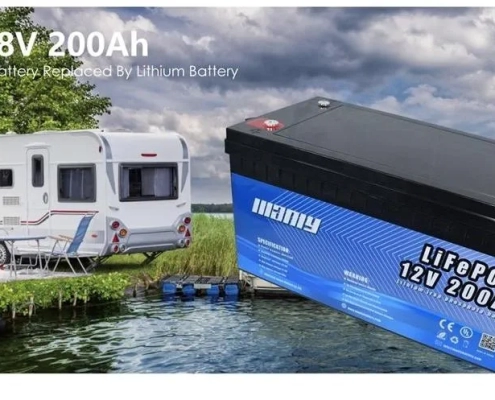What’s the Difference Between 48v and 51.2v Golf Cart Batteries
Table of Contents
- What’s the Difference Between 48v and 51.2v Golf Cart Batteries
Understanding the differences between 48v and 51.2v golf cart batteries is a crucial step in choosing the right one for your golf cart. These battery systems power golf carts differently, impacting everything from performance to efficiency and maintenance needs. This article’ll delve into these two popular voltage options, helping you decide which one best suits your needs.
Overview of 48v Golf Cart Batteries and 51.2v Golf Cart Batteries
48v Golf Cart Batteries
48v golf cart batteries have been the industry standard for many years. These batteries are known for their wide availability, especially in lead-acid form. Most older golf cart models rely on 48V systems, making them a familiar choice for golf cart owners. A 48 volt golf cart battery system commonly comprises six 8-volt batteries or eight 6-volt batteries connected in series, regardless of whether lead-acid or AGM batteries are utilized. This configuration is employed to achieve the necessary voltage for the system.
One of the critical reasons for their popularity is their compatibility with a wide range of golf cart parts. Because they’ve been around for so long, it’s easy to find replacement parts, and many golf carts are designed to work specifically with 48V systems. This convenience can provide a sense of ease for golf cart owners. Despite these advantages, the 48v golf cart batteries have some drawbacks, particularly in maintenance and overall efficiency.
51.2v Golf Cart Batteries
While 48v golf cart batteries are reliable, newer technologies like 51.2v are making waves. These batteries are typically lithium-based and are becoming more popular due to their higher voltage, increased efficiency, and better overall performance. 51.2v golf cart batteries often use lithium-ion technology, which offers several advantages over traditional lead-acid or AGM options.
The higher voltage of 51.2v golf cart batteries provides improved power output, meaning golf carts equipped with these batteries can handle more challenging terrain or heavier loads with greater ease. This enhanced performance can excite golf cart enthusiasts. Lithium batteries require little to no maintenance, making them a preferred option for those looking for convenience.
48v Golf Cart Batteries: Pros and Cons
Pros:
- Widespread Availability: 48 volt golf cart batteries are readily available in various stores and online platforms, offering convenient access for maintenance and replacements.
- Affordable: These batteries are generally less expensive than newer lithium-based options, making them a budget-friendly choice.
- Compatibility: Many older golf cart models are explicitly designed for 48v golf cart batteries, so no modifications are needed when replacing batteries.
Cons:
- High Maintenance: Lead-acid 48v golf cart batteries require regular maintenance, including checking and refilling water levels to prevent damage.
- Lower Efficiency: These batteries typically offer 80-85% energy efficiency, leading to more frequent charging and less effective energy use.
- Gradual Power Loss: As the battery charge decreases, the cart’s performance diminishes, meaning less speed and power as the battery drains.
- Heavy Weight: Lead-acid 48v golf cart batteries are bulky and heavy, which can affect the handling and range of the golf cart.
48v (51.2v) Golf Cart Lithium Battery: Pros and Cons
Pros:
- Higher Voltage & Better Performance: The higher voltage of the 48v (51.2v) golf cart lithium battery provides more power, improving speed and performance, especially in hilly terrains or when carrying heavy loads.
- Increased Efficiency: Lithium batteries boast an efficiency rate of 92-98%, allowing for longer driving ranges and more effective energy use than traditional lead-acid batteries.
- Maintenance-Free: Unlike lead-acid batteries, 48v (51.2v) golf cart lithium battery requires no regular upkeep, such as water level checks, making it a hassle-free option.
- Longer Lifespan: These batteries often last 8 to 10 years, much longer than lead-acid alternatives, typically lasting around 3 to 5 years.
- Lighter Weight: 48v (51.2v) golf cart lithium battery systems are much lighter, reducing the overall weight of the cart and improving its handling and efficiency.
Cons:
- Higher Upfront Cost: The upfront cost of a 48 volt (51.2 volt) lithium battery for a golf cart is notably higher compared to lead-acid alternatives, resulting in a higher overall investment.
- Compatibility Issues: Older golf cart models may require additional modifications or new components to handle the increased voltage, potentially adding to the overall conversion cost.
- Newer Technology: While manufacturers claim long lifespans, 48v (51.2v) golf cart lithium battery technology is relatively new, and long-term reliability is still being studied in real-world conditions.
Can You Convert a 48v Golf Cart to Lithium Battery?
The Conversion Process
Converting a golf cart from traditional 48v golf cart batteries to a 48v (51.2v) golf cart lithium battery is possible and offers significant performance and efficiency gains. The process is straightforward but may require additional equipment depending on the specific model of your cart.
- Choosing the Right Battery: Many manufacturers offer drop-in lithium batteries that fit into the existing battery compartment of a 48v system without requiring tray modifications.
- Ensuring Compatibility: Verifying that your golf cart’s motor, controller, and charger are compatible with a 48v (51.2v) golf cart lithium battery is crucial. You may need to replace some components if they cannot handle the higher voltage.
- Professional Assistance: When considering converting to a 48v (51.2v) golf cart lithium battery, it’s crucial to consult a professional or your cart’s manufacturer. This ensures the conversion process is smooth and your golf cart operates efficiently without any compatibility issues.
Performance Comparison Between 48v and 48v (51.2v) Golf Cart Lithium Battery
Power Output and Torque
Power output is one of the most important factors when comparing 48v golf cart batteries to 48v (51.2v) golf cart lithium battery systems. Power output refers to the amount of energy a battery provides to the golf cart’s motor. The higher the voltage, the more energy is delivered.
- 48v Golf Cart Batteries: These batteries offer reliable power for most recreational uses, such as driving on flat terrain and carrying lighter loads. However, as the battery drains, the cart’s power and speed decrease, which can be frustrating when driving for long periods without recharging.
- 48v (51.2v) Golf Cart Lithium Battery: Lithium batteries offer a steady power output across the entire charge cycle, ensuring consistent performance for golf carts regardless of the battery’s charge level. The extra voltage in the 48v (51.2v) golf cart lithium battery also delivers better torque, making it easier for the cart to climb hills and carry heavy loads without losing speed or power.
Range and Efficiency
Battery range refers to how far your golf cart can travel on a single charge. When comparing 48v golf cart batteries to 48v (51.2v) golf cart lithium battery systems, lithium batteries outperform lead-acid batteries in terms of efficiency and range.
- 48v Golf Cart Batteries: While lead-acid 48v golf cart batteries are effective for short trips, their range is limited due to their lower energy efficiency. Typically, a 48v system converts around 80-85% of stored energy into usable power, leading to a shorter driving range.
- 48v (51.2v) Golf Cart Lithium Battery: Lithium batteries, on the other hand, are highly efficient, converting up to 98% of stored energy into usable power. This increased efficiency leads to a much longer driving range, making lithium systems ideal for golf cart owners who need to travel greater distances or use their carts for more extended periods.
In addition to the range, 48v (51.2v) golf cart lithium battery systems are better at maintaining efficiency across various driving conditions, such as steep hills, rough terrain, or colder climates. The higher voltage ensures the cart performs consistently without experiencing the power dips that can occur with lead-acid 48v golf cart batteries.
Charging Time
The time it takes to recharge your golf cart’s battery is another critical factor for many owners, particularly those who use their carts frequently. 48v golf cart batteries and 48v (51.2v) golf cart lithium battery systems differ significantly in their charging speeds.
- 48v Golf Cart Batteries: Lead-acid batteries typically take longer to charge. A full charge for 48v golf cart batteries can take anywhere from 8 to 10 hours, depending on the charger and the condition of the batteries. This long charge time can be inconvenient, especially if you need to use your golf cart multiple times throughout the day.
- 48v (51.2v) Golf Cart Lithium Battery: Lithium batteries support faster charging, often reaching a full charge in as little as 4 to 6 hours. This is especially beneficial for golf cart owners who use their carts for commercial purposes, where downtime needs to be minimized.
The ability to quickly recharge and return on the road makes 48v (51.2v) golf cart lithium battery systems more efficient and user-friendly for those prioritizing short charging times.
Maintenance-Free Benefits of Lithium
The lack of required maintenance is one of the most significant advantages of switching from 48v golf cart batteries to 48v (51.2v) golf cart lithium battery systems. Here’s why:
- No Watering: Traditional 48v golf cart batteries need regular water refills to maintain the correct electrolyte balance. Forgetting to do this can lead to battery damage or failure. With a lithium system, this step is eliminated.
- No Corrosion: Lead-acid batteries are prone to corrosion, especially around the terminals, which can affect performance. 48v (51.2v) golf cart lithium battery systems do not suffer from this issue, meaning you won’t have to worry about cleaning terminals or dealing with the effects of corrosion.
- Longer Lifespan: The need for less maintenance also contributes to lithium batteries’ longer lifespan. Because they don’t suffer from issues like electrolyte imbalances or sulfation (a common problem in lead-acid batteries), 48v (51.2v) golf cart lithium battery systems can last up to 10 years or more with minimal intervention.
For golf cart owners seeking a dependable and low-maintenance power solution, transitioning to 48-volt (51.2-volt) lithium battery systems for golf carts offers an advanced and hassle-free option.
Cost Considerations: 48v vs 51.2v
When comparing the costs of 48v golf cart batteries and 48v (51.2v) golf cart lithium battery systems, it’s essential to look beyond the initial purchase price. While lithium batteries generally cost more upfront, the long-term savings they offer through reduced maintenance and increased lifespan make them a more economical choice over time.
Upfront Cost
- 48v Golf Cart Batteries: Lead-acid 48v golf cart batteries are typically more affordable initially. Depending on the brand and specifications, a complete set can cost between $800 and $1,200. This lower upfront cost makes lead-acid batteries a popular choice for those looking for a cost-effective solution for their golf cart.
- 48v (51.2v) Golf Cart Lithium Battery: The upfront cost for 48v (51.2v) golf cart lithium battery systems is considerably higher. A full lithium-ion battery system can range from $2,000 to $3,500, depending on the brand and battery capacity. The higher price point may deter some buyers, but it’s important to consider the long-term value lithium batteries provide.
Long-Term Savings
While lead-acid 48v golf cart batteries are cheaper, they come with higher ongoing costs due to frequent maintenance and shorter lifespans.
- Maintenance Costs: Lead-acid batteries require regular maintenance, including water refills and terminal cleaning, which can add up over time. Moreover, lead-acid batteries need to be replaced every 3 to 5 years, meaning you’ll likely buy multiple sets during the lifetime of your golf cart. In contrast, 48v (51.2v) golf cart lithium battery systems are virtually maintenance-free and can last up to 10 years or more. This reduced maintenance translates to significant savings over time.
- Battery Replacement Frequency: With a lifespan of around 3 to 5 years, lead-acid 48v golf cart batteries may need to be replaced multiple times during the life of your golf cart. The frequent replacement not only adds to the cost but also contributes to more downtime for your vehicle. On the other hand, 48v (51.2v) golf cart lithium battery systems often last 8 to 10 years, reducing the need for replacements and ensuring your cart remains operational for more extended periods without interruption.
Total Cost of Ownership
When considering the total cost of ownership, 48v (51.2v) golf cart lithium battery systems tend to offer better long-term value. Despite the higher upfront costs, the longevity, efficiency, and lack of maintenance make lithium batteries a more cost-effective solution over the lifetime of the golf cart.
- Lead-Acid Batteries: With the need for regular maintenance, frequent replacements, and inefficient energy conversion, the total cost of owning lead-acid 48v golf cart batteries can add up quickly. While they may be cheaper to purchase initially, the ongoing expenses make them less attractive over time.
- Lithium Batteries: Although 48v (51.2v) golf cart lithium battery systems are more expensive to buy, they offer significant savings over time due to their maintenance-free nature, longer lifespan, and superior energy efficiency. These factors contribute to a lower total cost of ownership, making them a wise investment for those looking to save money in the long run.
Conclusion: Choosing Between 48v and 48v (51.2v) Golf Cart Batteries
Selecting the right battery system for your golf cart ultimately depends on your specific needs, budget, and how you plan to use your vehicle. Both 48v golf cart batteries and 48v (51.2v) golf cart lithium battery systems have their strengths and weaknesses, and understanding these differences can help you make an informed decision.
- 48v Golf Cart Batteries: If you’re looking for a cost-effective solution and don’t mind the added maintenance, lead-acid 48v golf cart batteries could be the right choice. They are readily available, affordable, and compatible with most older golf cart models. However, be prepared for regular upkeep and the potential need for replacements every few years.
- 48v (51.2v) Golf Cart Lithium Battery: For those who value long-term savings, superior performance, and low maintenance, investing in a 48v (51.2v) golf cart lithium battery system is the better option. Although the initial cost is higher, the benefits of lithium technology—such as increased range, faster charging, and longer lifespan—make it a worthwhile investment for frequent users or those seeking convenience.
When deciding between lead-acid 48v golf cart batteries and 48v (51.2v) golf cart lithium battery systems, consider your driving habits, budget, and golf cart’s specific requirements. Evaluating the pros and cons of each option will allow you to make an informed decision based on your unique needs.

